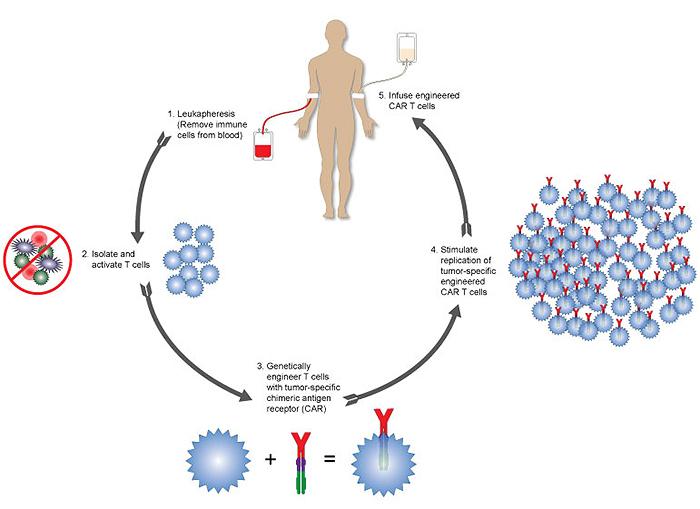Cellular Immunotherapy Center
The goal of cancer immunotherapy is to use the host immune system to direct antitumor responses. Immunotherapy interventions include checkpoint inhibitors, viral therapy, vaccination with peptides and/or dendritic cells, and adoptive cell transfer. In adoptive cell transfer with chimeric antigen receptor (CAR) T cells, a patient’s own immune cells are collected, genetically modified to target the cancer cells, and reintroduced to the patient. CAR T cell therapy has demonstrated promise in directing antitumor immune responses and has been successfully used in the treatment of B cells malignancies, such as chronic lymphocytic leukemia and acute lymphocytic leukemia. The success with hematologic malignancies has paved the way for the development of CAR T cells for other cancer types, including solid tumors.
At the heart of this immunotherapy is the chimeric antigen receptor. The receptor is a chimera of different genes — parts that confer immune T cell function combined with parts that confer tumor recognition. The successful combination redirects the CAR T cell to identify and kill the selected antigen represented on (ideally all) tumor cells.
The adoptive CAR T cell process works as follows:
- Step 1: T cells are isolated from the patient using specialized blood draw.
- Step 2: Specific T cell populations are selected and activated in the laboratory.
- Step 3: T cells are genetically engineered to produce chimeric antigen receptors (CARs) on the cell surface. Through the CAR, the T cell recognizes and kills tumor cells.
- Step 4: CAR T cells are grown in the laboratory until they number in the billions.
- Step 5: CAR T cells are infused back into the patient.
- Step 6: CAR T cells multiply in the patient’s body, home to tumor sites, and recognize and kill cancer cells.
The CAR T cell therapy group comprises world class scientific leaders who continue to pioneer and develop breakthrough immunotherapies. City of Hope is one of only a handful of centers in the country that treat cancer using CAR T cell therapy. Success depends on a comprehensive approach by a multidisciplinary team that includes oncologists, radiologists, pathologists, nurses, social workers and specially trained support staff. City of Hope combines leading-edge research with attentive patient care to deliver groundbreaking CAR T cell treatments for blood cancers such as leukemia, lymphoma and multiple myeloma, and solid tumors including prostate and brain cancer.
Highlights
- Researchers are discovering and applying new T cell therapies by genetically reprogramming T cells with chimeric antigen receptors (CARs) to tailor the patient’s immune response to their specific cancer.
- CAR T cell therapy has demonstrated promise in directing antitumor immune responses and has been successfully used in the treatment of B cell malignancies such as chronic lymphocytic leukemia and acute lymphocytic leukemia.
- The success with hematologic malignancies has paved the way for the development of CAR T cells for other cancer types, including solid tumors.
- City of Hope is one of only a handful of centers in the country with FDA approval to treat cancer using CAR T cell therapy in aggressive non-Hodgkin lymphoma.


